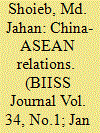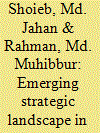|
|
|
Sort Order |
|
|
|
Items / Page
|
|
|
|
|
|
|
| Srl | Item |
| 1 |
ID:
120935


|
|
|
|
|
| Publication |
2013.
|
| Summary/Abstract |
Asia-Pacific region is an important part of the globe as competing interests of big powers often generate conflict to the ground. Over the past decade, the world has witnessed rapid development between Association of South East Asian Nations (ASEAN) and China. Historically China tries to maintain a very good relation with its neighbouring countries. When China was the middle kingdom in 1300A.D.-1900 A.D., it maintained a very close tie with its neighbours. China is rising again as a formidable global power; and its rise is one of the most critical developments in the contemporary world. In the eve of rising, China gives value to the relationship with the ASEAN. Since the beginning of ASEAN in 1967, China maintained relations with the regional association. However, it was the late 1980s that China started to intensify its efforts to establish diplomatic relations with ASEAN member states. In recent years, both are closer to each other than before. Even though, differences exist between the two; for example, the case of South China Sea. Their relations are more focused on economic cooperation; however, strategic partnerships continue. This paper studies phase-wise trends, and critical issues of ChinaASEAN relations.
|
|
|
|
|
|
|
|
|
|
|
|
|
|
|
|
| 2 |
ID:
133522


|
|
|
|
|
| Publication |
2014.
|
| Summary/Abstract |
The paper seeks to assess the growing strategic importance of the Bay of Bengal and how this signifies for Bangladesh's imperative to develop strong maritime capabilities. With the growing significance of the Bay of Bengal, both the littoral and the extra-littoral countries are reassessing their interests in this region and reformulating respective strategies to ensure optimum benefit in their favour. After the verdict by the International Tribunal for the Law of the Sea (ITLOS) in March 2012, Bangladesh is now able to establish its claim over a significant area in the Bay of Bengal. These emerging realities are driving Bangladesh to develop capabilities to project effective control over its maritime zone and to ensure sustainable utilisation of marine resources. To respond efficiently, Bangladesh government has undertaken various initiatives including modernisation of the Bangladesh Navy with an aim of establishing a three dimensional force. The paper, based on secondary literature, finds that there is a growing interest among the countries in the Bay of Bengal area leading to a competitive strategic atmosphere for countries like Bangladesh. The findings also suggest that Bangladesh's drive for maritime capability building is a timely and pragmatic step which requires further strengthening in the coming years. Besides, the paper also argues that Bangladesh needs to formulate a comprehensive maritime strategy, focusing on diverse sectors of capability building. Some key areas can include empowering the coast guard, resource exploration and exploitation capacities, maritime infrastructure development for connectivity and seaborne trade as well as well-coordinated maritime governance.
|
|
|
|
|
|
|
|
|
|
|
|
|
|
|
|
| 3 |
ID:
142744


|
|
|
|
|
| Summary/Abstract |
Global climate change in recent years has turned into a complex phenomenon. The issue has drawn widespread attention globally. South Asia is a region which occupies about 5 percent of the world’s total landmass and 20 percent of the world’s total population which is expected to rise about 25 percent by 2025. Over the years, South Asian countries are becoming affected with multitude of climate related hazards including cyclones, floods, droughts, extreme temperatures, glacial lake outburst floods (GLOFs) and storm surges. Climate does not maintain national boundary, therefore, combined efforts are essential to mitigate such calamities. Regional arrangements are considered essential to face climate change challenges. This paper examines initiatives of South Asian Association for Regional Cooperation (SAARC) on climate change issue and tries to recommend what further steps the organisation can adopt in this regard. Although SAARC has taken some initiatives, more concrete and coordinated actions are necessary to face the calamities of climate change.
|
|
|
|
|
|
|
|
|
|
|
|
|
|
|
|
| 4 |
ID:
165530


|
|
|
|
|
| Summary/Abstract |
Global terrorism is a multi-dimensional concern. Nowadays, terrorists use multifaceted tactics in order to avoid various counterterrorism operations. In recent years, a comprehensive drone campaign by the United States and death of some top leaders pushed Al Qaeda, Islamic State and other terrorist groups to find out alternative ways to convey their messages to their followers and sympathizers. Terrorist groups are resorting to internet-based alternative media to spread terrorism. Internet is also helping terrorist groups in training, fundraising, recruiting manpower, planning and executing terrorist attacks. Lone-wolf terrorists are also taking advantage of internet-based media in communication technologies. Internet has brought a shift in the spectra of global terrorism. An understanding of the linkage between terrorism and internet-based alternative media can help in formulating a counterterrorism strategy. This paper examines the role of the internet-based alternative media in global terrorism and counterterrorism. The research finding suggests that terrorist groups are quite successful in using internet-based alternative media to reach their audiences. It is also evident that the internet also can play an important role in global counterterrorism efforts.
|
|
|
|
|
|
|
|
|
|
|
|
|
|
|
|
|
|
|
|
|